Behind the Rivalry: Lynyrd Skynyrd vs. Neil Young
In the world of rock ‘n’ roll, controversies are as legendary as the music itself. One of the most iconic clashes in the history of rock occurred between the legendary Neil Young and the Southern rock titans Lynyrd Skynyrd. This feud, marked by musical disses and onstage showdowns, has become the stuff of rock folklore. Let’s dive into the gritty details of the Neil Young vs. Lynyrd Skynyrd controversy.
The Prelude: Musical Philosophies Clash
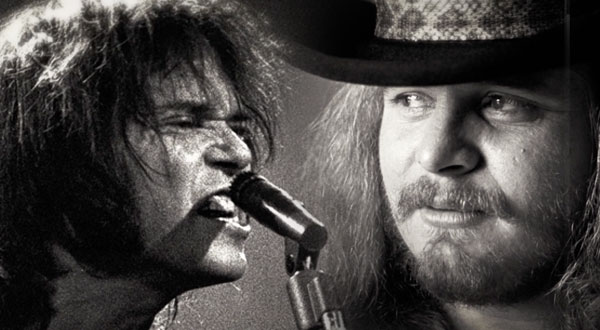
The origins of the Neil Young vs. Lynyrd Skynyrd controversy can be traced back to the early 1970s when Neil Young, a Canadian singer-songwriter known for his thought-provoking lyrics, released the track “Southern Man” on his album “After the Gold Rush.” The song addressed the deeply rooted social issues and historical injustices in the American South, particularly focusing on racism and the legacy of slavery.
“Southern Man” was a poignant critique that sought to draw attention to the struggles faced by African Americans and the broader Southern population. Neil Young’s intent was to use his platform to shed light on systemic problems, but the song’s sweeping generalizations and stark criticisms drew the ire of Lynyrd Skynyrd, a Southern rock band with roots deep in the heart of Alabama.
Lynyrd Skynyrd, comprising musicians who proudly celebrated their Southern heritage, took offense at what they perceived as a one-sided portrayal of the South. Feeling that Young had unfairly characterized an entire region, they decided to respond in the language they knew best – music.
The Retaliation: “Sweet Home Alabama”
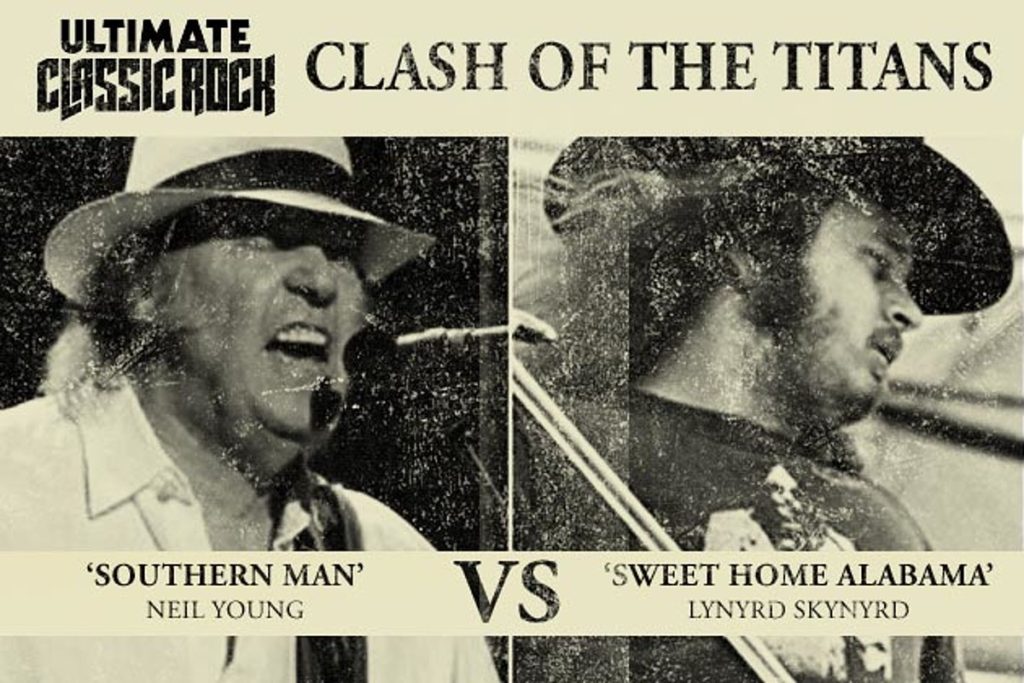
In 1974, Lynyrd Skynyrd retaliated with the release of “Sweet Home Alabama,” a Southern rock anthem that would become one of their most iconic songs. With its catchy guitar riffs and defiant lyrics, the track not only defended the South but also directly addressed Neil Young. The lyrics include lines like “Well, I hope Neil Young will remember, a Southern man don’t need him around anyhow,” making it clear that Lynyrd Skynyrd was firing back at the Canadian troubadour.
“Sweet Home Alabama” wasn’t merely a musical response; it was a cultural phenomenon that resonated with audiences far beyond the Southern United States. The track not only solidified Lynyrd Skynyrd’s place in the rock pantheon but also added fuel to the growing fire of the Neil Young vs. Lynyrd Skynyrd feud.
Musical Crossfire: Critique Meets Rebel Spirit
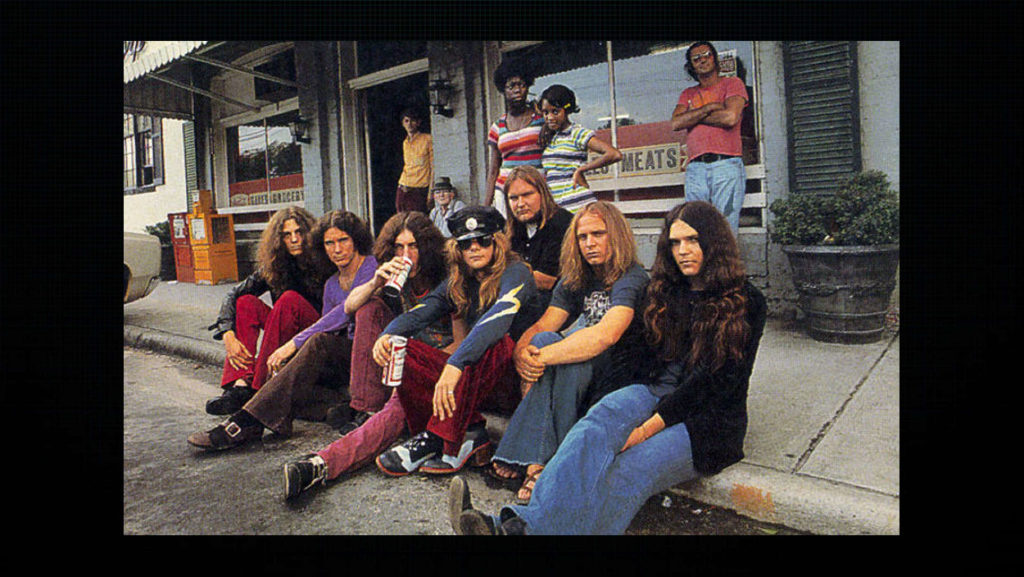
The controversy highlighted a broader clash of ideologies within the rock music scene. Neil Young, known for his socially conscious lyrics and protest songs, collided with Lynyrd Skynyrd, a band deeply rooted in Southern pride and traditions. The feud brought to the forefront the tensions between artists expressing their views through music and those who felt their way of life was being unfairly criticized.
The prelude to the Neil Young vs. Lynyrd Skynyrd controversy thus set the stage for a musical showdown that would captivate fans and leave an indelible mark on the history of rock ‘n’ roll.
The Onstage Showdown: The Last Waltz
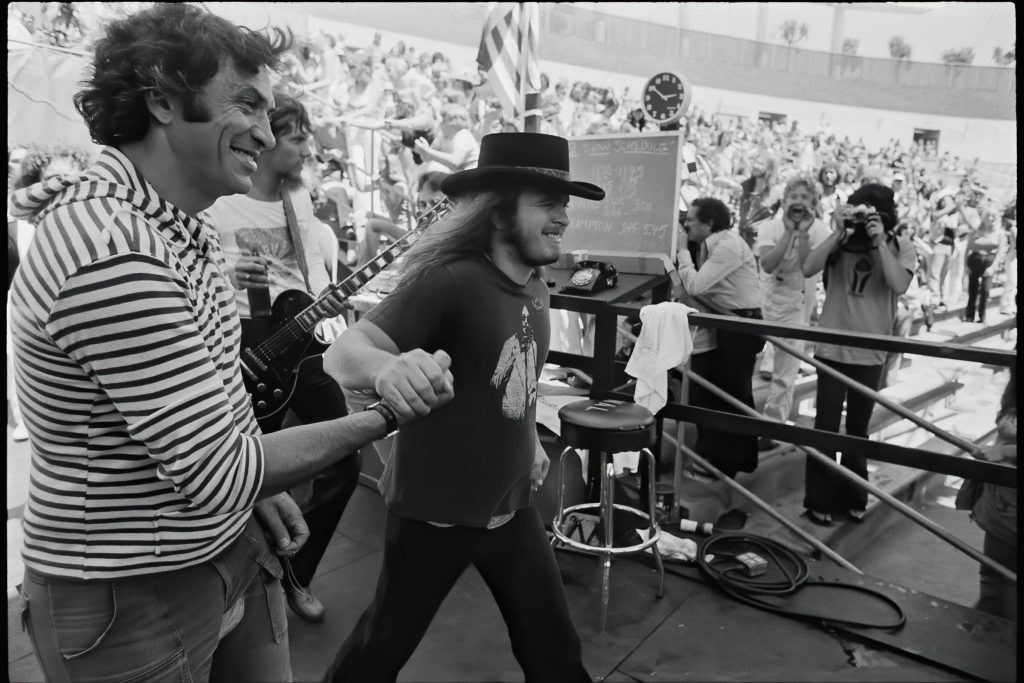
The pinnacle of the Neil Young vs. Lynyrd Skynyrd feud unfolded during a momentous event in rock history – “The Last Waltz” concert in 1976. Neil Young, joining The Band on stage, performed his song “Southern Man,” reigniting the simmering tensions with Lynyrd Skynyrd. In the audience, members of Lynyrd Skynyrd, particularly their charismatic frontman Ronnie Van Zant, took exception to Young’s performance.
As “Southern Man” echoed through the venue, Van Zant couldn’t contain his reaction. Shouting from the crowd, he challenged Young’s perspective, creating an electrifying moment of live confrontation. The exchange was both a clash of musical ideologies and a spontaneous eruption of rock ‘n’ roll passion. The onstage showdown solidified the feud’s place in rock folklore, capturing the raw emotion and unpredictability that defined an era of rebellious music.
The Fallout: Southern Sonic Shockwaves
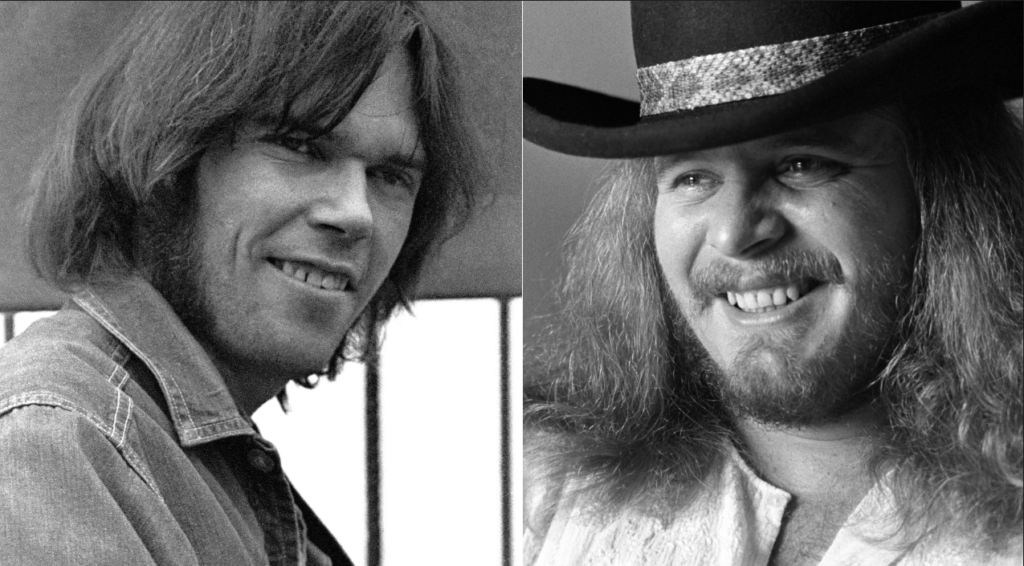
In the aftermath of the Neil Young vs. Lynyrd Skynyrd controversy, both parties faced significant repercussions. Lynyrd Skynyrd, despite the success of “Sweet Home Alabama,” found themselves navigating a delicate balance. While the song became an anthem for Southern pride, some critics argued that the band had perhaps been overly sensitive in responding to Neil Young’s social commentary. The fallout saw Lynyrd Skynyrd dealing with a polarized fan base, torn between those who lauded them for defending the South and others who questioned their response.
For Neil Young, the fallout manifested in the ongoing debate surrounding “Southern Man” and its impact on the Southern rock genre. While the song had initially been a critique of social issues, it unintentionally became a focal point of a broader clash of ideologies within the rock community. Young found himself navigating the complexities of being both a social commentator and a lightning rod for controversy.
The fallout, however, also served as a catalyst for introspection within the music industry, prompting artists and fans alike to consider the role of musicians in addressing societal issues. The controversy, while divisive, became a touchstone for discussions about the responsibilities of artists and the power dynamics inherent in the world of rock ‘n’ roll.
Unplugged Truths: Mutual Respect Prevails

Behind the scenes, the Neil Young vs. Lynyrd Skynyrd feud had a more complex narrative. While the public witnessed heated exchanges on stage, there existed a nuanced relationship between the musicians. Interviews and later reflections revealed that, despite the ideological differences, there was a mutual respect for each other’s artistic prowess.
Both Neil Young and Lynyrd Skynyrd acknowledged the impact they had on each other’s musical journeys. Behind closed doors, away from the spotlight, conversations unfolded about the nature of their craft and the unique perspectives they brought to the table. The feud, while fueled by public posturing, also hinted at a shared understanding among artists navigating the tumultuous landscape of the rock music scene.
Resonating Rifts: Beyond the Roar

The Neil Young vs. Lynyrd Skynyrd controversy left an enduring legacy that reverberates through the corridors of rock history. Beyond the public spectacle and onstage drama, the feud became a symbol of the diverse voices within the genre. It forced fans, critics, and musicians alike to confront the intersection of music, ideology, and social commentary.
The legacy extends beyond the feud’s immediate impact, influencing subsequent generations of rock musicians. The clash between Neil Young and Lynyrd Skynyrd serves as a reminder that within the rebellious spirit of rock ‘n’ roll, there’s room for dissent, dialogue, and diverse expressions. As fans continue to revisit the music and the history, the legacy of this iconic feud remains a testament to the enduring power of rock to spark conversations, challenge perspectives, and shape the very fabric of the genre.
Conclusion: A Symphony of Musical Legends

The legacy of the Neil Young vs. Lynyrd Skynyrd controversy extends beyond the initial clash. It serves as a multifaceted narrative of the highs and lows of rock ‘n’ roll, from the fiery confrontations on stage to the heartbreaking tragedies that befell one of the bands. As fans revisit the music and the history, the controversy stands as a reminder that even in the face of discord, the power of music endures, transcending differences and sparking conversations that resonate through the ages.











